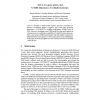Free Online Productivity Tools
i2Speak
i2Symbol
i2OCR
iTex2Img
iWeb2Print
iWeb2Shot
i2Type
iPdf2Split
iPdf2Merge
i2Bopomofo
i2Arabic
i2Style
i2Image
i2PDF
iLatex2Rtf
Sci2ools
112
click to vote
ECWEB
2004
Springer
2004
Springer
OCL-Constraints for UMM Business Collaborations
Abstract. Recently, a trend towards business processes in Business-toBusiness e-Commerce (B2B) is apparent. One of the most promising approaches is UN/CEFACT’s modeling methodology (UMM) based on UML. However, developing a new UMM model for each small variation in a business process would lead in a multitude of “similar” business processes. Thus, a more generic UMM model together with well-defined constraints for different business environments is a better approach to ensure unambiguity. In this paper we develop templates for such constraints based on an extended version of OCL. 1 Motivation For a long time standardization in Business-to-Business e-Commerce (B2B) followed a pure data centric approach. Recent standardization approaches take business processes into account. The most prominent examples include: Business Process Execution Language (BPEL) [2], Business Process Modeling Language (BPML) [1], and ebXML Business Process Specification Schema (BPSS) [13]. Since all of them ...
Related Content
| Added | 01 Jul 2010 |
| Updated | 01 Jul 2010 |
| Type | Conference |
| Year | 2004 |
| Where | ecweb |
| Authors | Birgit Hofreiter, Christian Huemer, Werner Winiwarter |
Comments (0)

